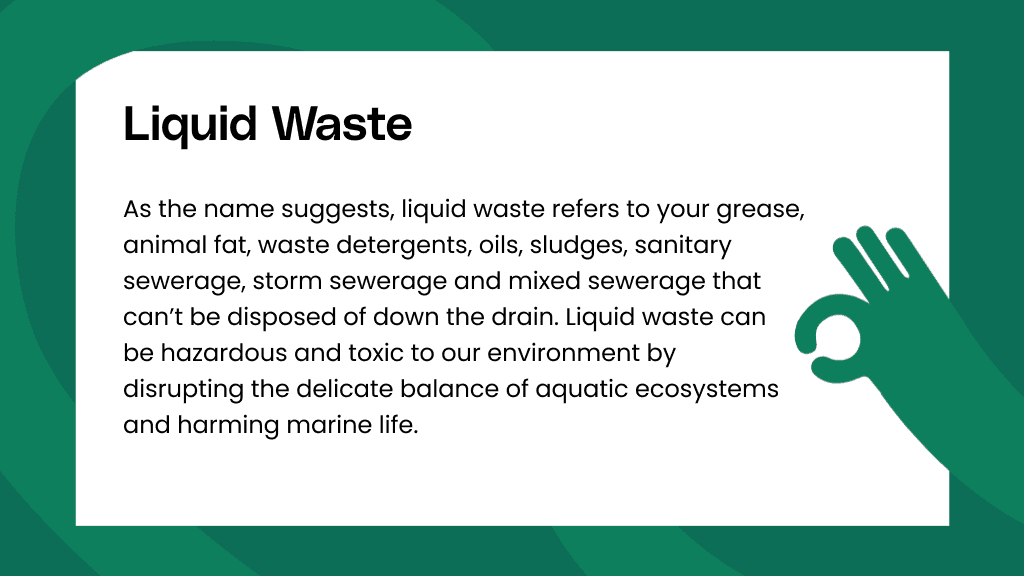Indicators on Reclaim Waste You Should Know
Table of ContentsNot known Facts About Reclaim WasteSome Ideas on Reclaim Waste You Should KnowSome Known Incorrect Statements About Reclaim Waste Reclaim Waste for DummiesFascination About Reclaim Waste
Residential sewage waste refers to the waste and items from a residential septic container. The proper monitoring and disposal of domestic sewage waste call for liquid waste to be transferred to a sewer treatment plant where the appropriate methods and devices are used to purify and dispose of waste.
Industrial waste often includes possible hazards, such as flammable products or a mixture of liquid and strong waste items, and requires an advanced and thorough disposal procedure. The disposal of industrial waste commonly involves the filtering of waste prior to transport to ensure risk-free and appropriate disposal. Hazardous waste is created from byproducts and overflow of industrial procedures and manufacturing.
This sort of waste can not use the same sewer administration transport or procedures as septic or business fluids. The industrial waste management process needs the assessment and screening of fluid waste before it undergoes the disposal process (liquid waste disposal melbourne). Runoff waste is the liquid waste that comes from runoff and excess stormwater in highly inhabited areas or cities
Drainage waste can trigger contamination and flooding if not dealt with correctly. Making certain proper waste management can protect against calamities and minimize environmental injury.
The Ultimate Guide To Reclaim Waste
Get in touch with PROS Providers today to discover our waste administration and disposal solutions and the appropriate means to take care of the fluid waste you produce.
(https://forums.hostsearch.com/member.php?271151-reclaimwaste1)This so-called 'wastewater' is not just an important source however, after therapy, will be launched to our land, waterways or the sea. Used water from bathrooms, showers, bathrooms, kitchen area sinks, laundries and commercial processes is known as wastewater.

water utilized to cool down machinery or tidy plant and equipment). Stormwater, a type of wastewater, is runoff that streams from agricultural and metropolitan areas such as roof coverings, parks, gardens, roadways, paths and rain gutters right into stormwater drains, after rainfall. Stormwater flows without treatment directly to regional creeks or rivers, at some point reaching the sea.
Rumored Buzz on Reclaim Waste
In Queensland, the majority of wastewater is dealt with at sewer therapy plants. Wastewater is transported from domestic or commercial websites via a system of sewage systems and pump terminals, recognized as sewage reticulation, to a sewer treatment plant.
The Department of Natural Resources recommends city governments about managing, operating and keeping sewage systems and treatment plants. In unsewered areas, local federal governments might call for homeowners to set up individual or household sewage therapy systems to deal with domestic wastewater from toilets, kitchens, bathrooms and washings. The Division of Natural Resources authorises making use of household systems when they are proven to be reliable.
The majority of stormwater gets no treatment. In some brand-new communities, therapy of some stormwater to eliminate litter, sand and crushed rock has begun making use of gross contaminant traps. Wastewater therapy happens in four phases: Eliminates solid matter. Bigger solids, such as plastics and other objects mistakenly discharged to sewers, are gotten rid click this link of when wastewater is passed with screens.
Uses little living organisms understands as micro-organisms to damage down and remove remaining liquified wastes and fine fragments. Micro-organisms and wastes are included in the sludge.
Reclaim Waste for Dummies
Nutrient removal is not offered at all sewage therapy plants due to the fact that it requires expensive specialist devices. It is ending up being a lot more usual in Queensland. Clear liquid effluent produced after therapy may still include disease-causing micro-organisms. If this effluent is launched right into waterways such as rivers or the sea, the micro-organisms will eventually die out.

This normally implies wastewater needs to be dealt with or pollutants removed before it can be discharged to waterways. A lot of wastewater flows right into the sewerage system. Under the Act, city governments provide approvals and licences for ecologically pertinent activities (Ages) entailing wastewater releases that could have a regional impact. The division carries out authorizations and licences to ERAs including wastewater releases that may have a local or statewide impact.
Little Known Questions About Reclaim Waste.
Or else, examples are considered laboratory analysis. Often lots of examinations are needed to develop the degrees of each of the various pollutants such as oils, heavy steels and chemicals in water. Monitoring supplies accurate information regarding water top quality and can confirm that licence conditions are being fulfilled. The details obtained through tracking supplies the basis for making water top quality choices.